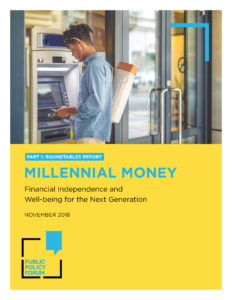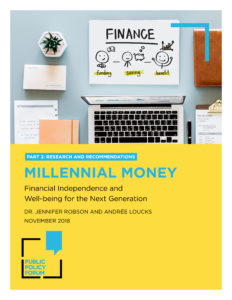
Millennial Money: Financial Independence and Well-Being for the Next Generation
Part One of the report brings together key findings on the current state of financial literacy among Canadian millennials – their challenges, barriers, and priorities. These were drawn from a series of four roundtables held in Toronto, Vancouver, Calgary and Halifax in partnership with the Canada Pension Plan Investment Board, the Financial Consumer Agency of Canada and Vancity.
In Part Two, PPF Fellow Jennifer Robson and Research Assistant Andrée Loucks build on what we heard in the roundtables and review the latest research to explore creative but feasible responses to key financial literacy challenges faced by millennials. Their analysis shows a surprisingly nuanced reality for millennials that merits close attention by policy-makers.
Summary & Recommendations
This two-part report, released during Canada’s Financial Literacy Month, is the culmination of a PPF project that sought to identify ways to improve the financial literacy of millennials.
Millennials are now one quarter of the Canadian population and the most important consumer segment in Canada.
Our research shows that, on average, millennials enjoy higher incomes and higher assets than gen-Xers, and are as likely to own a home. And yet, many still find themselves burdened by student and credit-card debt, and either trapped in low-paid jobs or zig-zagging between jobs in a way that makes it difficult to realize long-term financial goals. They are looking for innovative tools to help them navigate these challenges.
Part One of the report brings together key findings on the current state of financial literacy among Canadian millennials – their challenges, barriers, and priorities. These were drawn from a series of four roundtables held in Toronto, Vancouver, Calgary and Halifax in partnership with the Canada Pension Plan Investment Board, the Financial Consumer Agency of Canada and Vancity.
In Part Two, PPF Fellow Jennifer Robson and Research Assistant Andrée Loucks build on what we heard in the roundtables and review the latest research to explore creative but feasible responses to key financial literacy challenges faced by millennials.
Their analysis shows a surprisingly nuanced reality for millennials that merits close attention by policy-makers:
- Millennials in Canada are not less financially knowledgeable than other generations. They are doing OK when it comes to financial well-being and, in some ways, doing better than gen-Xers did at the same age.
- Millennial-led families are more likely to carry student debts, have somewhat higher outstanding student loan and credit card balances, and are more likely to have no retirement savings at all, compared to gen-X-led families did at the same age.
- Millennials are performing unexpectedly well in other respects: millennial-led families enjoy higher incomes, substantially higher assets (likely due to housing asset prices), and better access to workplace pensions and higher pension assets. They are as likely as gen-X-led families to budget and to own a home.
- Millennials face changes in labour markets and financial services that can re-shape their financial lives.
In response, PPF makes five recommendations:
- Make it easier to access student loan repayment assistance. Improve the Repayment Assistance Program in order to increase take up, by proactively contacting likely eligible borrowers and reducing the administrative burden on borrowers.
- Help small-savers who don’t otherwise receive many incentives from the tax system. Explore new ways to incentivize saving among lower-income millennials, such as means-tested top-ups for Tax Free Savings Accounts (TFSAs), paired with a lifetime contributions limit.
- Make sure younger consumers are in the picture when the Bank Act is reviewed. The review should:
- Consider measures to encourage regulated banks to extend ages of eligibility for low- or no-cost accounts
- Encourage financial institutions to develop sustainable financial products that offer affordable short-term credit
- Encourage financial institutions to treat product sales as learning opportunities for clients
- Support younger households facing housing affordability challenges in creative ways, by ensuring the upcoming National Housing Benefit considers eligibility issues for low-income millennials who may otherwise be excluded under current definitions of housing insecurity. Invest in research and testing of new approaches that offer alternatives to traditional market rental and ownership models.
- Help more working millennials plan ahead. In particular, use the Canada Revenue Agency (CRA) in order to motivate planning and monitoring by providing tax-filers with an annual overview of their retirement funds.










